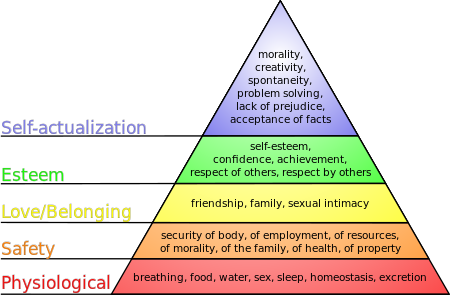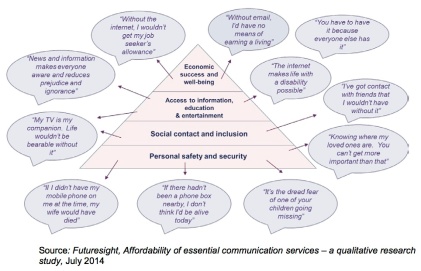Sometime ago this picture of a modified Maslow’s pyramid of needs was doing the rounds on Twitter.

It was meant to be a joke, but it turns out that it may not be that far off reality. According to research recently published by Ofcom, access to mobile services and access to the Internet are now viewed as essential to be able to live and function in society. These services help users:
- Stay (and feel) safe
- Keep in touch with family and friends
- Access information and entertainment
- Be productive
It is a very good fit with the standard depiction of Maslow’s hierarchy of needs, isn’t it?




We are at such an interesting time
The internet will be at the centre of societies possibilities as well as its problems. And given I have spent my working career building something called ‘the internet’ I find it interesting how I now enjoy my downtime more when I switch off my mail box and take time out with ‘print’ rather than being distracted by Flipboard and FB. So I have it in my DNA – but I now chose to keep it at bay.
And also how even more now – with digital saturation – the power of face-to-face communication and personal credibility and ‘agreeableness’ shapes trust and is the force multiplier on Word of Mouth – but still I triangulate my gut instincts agains online information.
And its interesting how “the internet” sounds so dated as a term – and the nuance comes in from ‘mobile’ and ‘social’. – and how we can do so much on the move and be validated so much by the experience and insights of others
(Im thinking on how we are planning and booking our third AirBnB-enabled holiday – and how the feedbacks of a family from German have us commit to say for 7 days with a stranger on a Croatian island – and how I so much resonate with the values and potential of AirBnB as a community)
The final twist for me comes in seeing the internet as a commercial offering delivered by business – because its been ‘my job’, – my investment schedules, my fight to justify the resources. It’s an infrastructure (high CapEx, OpEx, head-count, significant debt structures…) and yet it is now a social right and how do we service the commercial unattractive long tail of homes?
And when is the time right for a whole new purpose/belief driven model for communications as a social enterprise. Because it has a greater benefit above the needs of an organisation to spin out a return on its assets.
One thing I know is building the internet is hard, expensive and no one thanks you or even notices you when things are working. They will complain when you are not there. And direct-debit you into their sub-conscience when you are.
The internet is a commercial dilemma – the aim is just not to be noticed. But how do you differentiate the invisible?
[Then again Im old enough to remember shaking my head at the idea of people paying for bottled water… in the UK – where every one has a tap… so the business model for a fundamental human need can change… We just haven’t done the pivot]
Have a good weekend Ana!
James
LikeLike
What I found interesting about this report was how, in just a few years, how we communicate has changed so much to the point that we feel for our safety (even life) if we do not have access to the technology.
The other side of the report – and which you may find interesting – was a discussion about the affordability of communication services. And how a small segment of the population really struggles to pay for something that for others has become vital and, as you say, invisible.
LikeLike
but does it stop you from being in the present moment and prevent you from being able to connect with the immediate environment around you?
LikeLike
Yes, I think it does, David.
Not long ago, I was sitting in a restaurant. In another table was a family of 4, on holidays, each looking at their own phone. At one point, one of them decided to call somebody else on Skype, at which point they all focused on the Skype call, and forgot their own phones. They are all interacting with the person on the other side of that Skype call. But, as soon as the Skype call finished, they all went back to their own devices.
So, in a way, the technology helped them connected with someone far away. It helped to include the other person in their holidays. But, paradoxically, it created exclusion between the 4 persons sitting around that table.
LikeLike